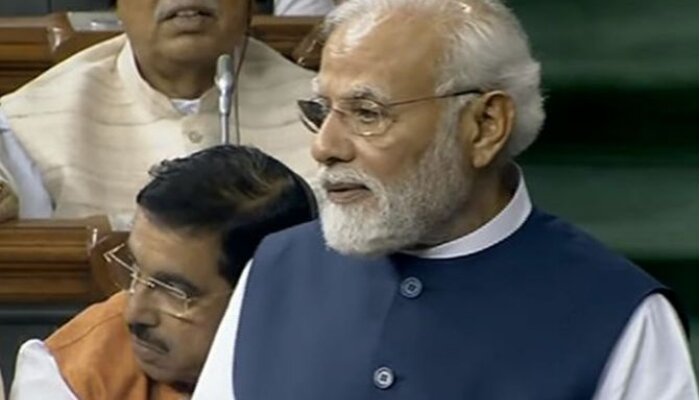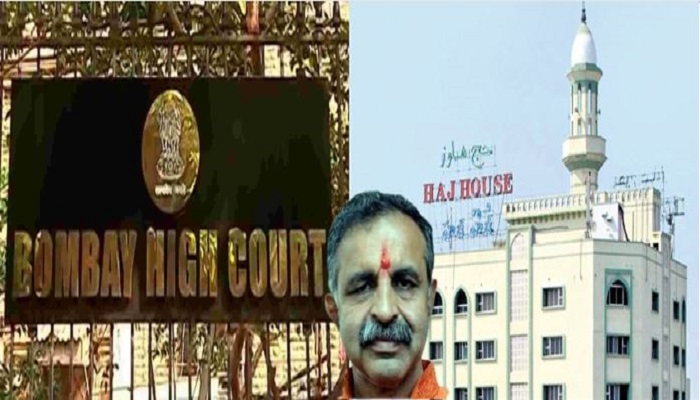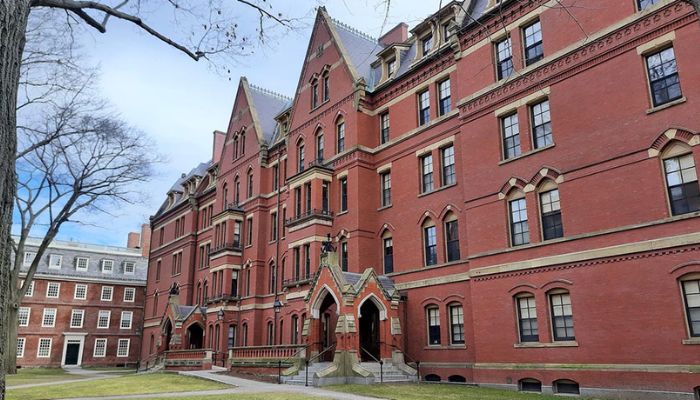They did tukde-tukde of Vande Mataram song: PM Modi on Congress

[ad_1]
Prime Minister Narendra Modi addressed the monsoon session of the parliament in Lok Sabha on 10 August. He replied to the opposition’s no-confidence motion and spoke on a number of issues including the national song Vande Mataram and slammed the Congress party in a scathing attack. “Who are these people,” he asked and charged, “The same ones who parted Mother India into three pieces. The same ones who cut two arms of the nation when they were supposed to eliminate its shackles. They are the same people who chopped not only Mother India but also Vande Mataram song because of appeasement politics.”
PM Modi’s reply to #NoConfidenceMotion in #LokSabha
“Who are these people who divided Maa Bharti in 3 parts? Who only talk about murder of Constitution and pray for death of Bharat Mata? These are the people who did ‘tukde tukde’ of Vande Mataram song… who support… pic.twitter.com/bsXw8UXMrc
— Mirror Now (@MirrorNow) August 10, 2023
The Bharatiya Janata Party stalwart was alluding to the year 1937 when Congress decided to appease the Muslims by dropping the final three stanzas of the national song and labelled them “communal.”
It is notable that the original Vande Mataram poem by Bankim Chandra Chatterjee has six stanzas, but only the first two stanzas were adopted as the national song. Therefore PM Modi said that Congress had chopped the Vande Mataram song.
A brief history of Vande Mataram
Bankim Chandra Chattopadhyay assiduously composed a song in 1870 that would go on to achieve a glorified national status yet be explosive in its entirety. The Bengali song Vande Mataram, which is knitted through the Anandamath novel was published in 1882. However, it would shortly come to be associated with the fight for India’s independence, playing a crucial role in the development of Indian politics.
India was still a part of the British empire when Anandamath was initially written in the 19th century. There was widespread intellectual, religious, and cultural deprivation at the time. Anandamath was created as a potent literary tool to arouse nationalistic impulses among the nation by renowned literary figure Chattopadhyay during this time, however, with a stipulation.
Anandamath was founded during the Bengal agrarian crisis, when the region was struck by three successive famines, in the early 1770s against the backdrop of the Fakir-Sannyasi Rebellion. However, interestingly, the novel blamed the agonising conditions on the ruler Nawab Mir Qasim and charged that the state’s downfall was caused by his tacit consent to The East India Company.
“The East India Company was then calling the shots from behind the facade of a puppet Muslim Nawab. It was rack-renting peasant surplus to augment revenues from which the Company extracted a massive tribute. The drive was so relentless that three successive droughts produced a famine of catastrophic proportions in 1770. Much of the land returned to waste and approximately one-third of the population starved to death,” noted historian Tanika Sarkar in “Birth of a Goddess: Vande Mataram, Anandamath and Hindu Nationhood.”
The account, according to her held “the Nawab responsible not just for widespread death and starvation, but also for a deliberate and total destruction of Hindus, of their honour, faith, caste and women. In other words, it forces a split between the agents and victims of the famine: the agents are Muslims and the starving and dying people are always identified as Hindus.”
Both the novel and Vande Mataram have been read from a variety of perspectives ever since they first appeared on the shelves. History demonstrated that the latter has drawn a lot of criticism from the Muslim community because many have claimed that the song has anti-Muslim overtones.
The fictitious characters in the book believed that the famine was a punishment meted out by Muslims to Hindus per Tanika Sarkar. Her translation read, “Our faith is ruined. Our caste and honour are gone, now even our lives are in danger unless we drive out these drunken Muslim wretches. How can we save the religion of Hindus,”
It further continued, “We do not want power for ourselves. We want to exterminate all the Muslims on this land as they are enemies of God. Many had resented the end of Hindu power and Hindus had been eager for the restoration of their faith.”
Vande Mataram is presented in the novel within this literary and ideological framework. Rabindranath Tagore performed the song for the first time in front of an audience in 1896 during a meeting of the Indian National Congress.
It later evolved into a battle cry during the 1905 partition of Bengal and quickly advanced to become a strongly evocative representation of the freedom movement. However, at this point, it seemed as though there was real tension between Muslims and Hindus. Muslim leaders started expressing their worries.
All India Muslim League President Syed Ali Imam declared, “I cannot say what you think, but when I find the most advanced province of India put forward the sectarian cry of ‘Bande Mataram’ as the national cry, and the sectarian Rakhi-Bandhan as a national observance, my heart is filled with despair and disappointment; and the suspicion that, under the cloak of nationalism, Hindu nationalism is preached in India becomes a conviction,” while speaking at the organisation’s second session in December 1908.
Muhammed Ali Jinnah, the founder of Pakistan reiterated his reservations years later. He expressed his disapproval of the song and penned, “Muslims all over (India) have refused to accept Vande Mataram or any expurgated edition of the anti-Muslim song as a binding national anthem,” in The New Times of Lahore, dated 1 March 1938.
The potential of the song to infuriate the Muslim population was recognised by others besides him. India’s first prime minister Pandit Jawahar Lal Nehru was also aware of the same. He had personally written to Rabindra Nath Tagore the previous year, in 1937 and voiced identical concerns that the song, despite its patriotic intentions, had religious biases towards the Hindu majority.
Tanika Sarkar recorded, “Nehru asked Tagore if the translation was accurate. It does seem that the background is likely to irritate the Muslims.” However, the latter pointed out that the first two of the five stanzas did not have any religious overtones. The following is its English translation by Sri Aurobindo Ghosh.
Mother, I praise thee!
Rich with thy hurrying streams,
bright with orchard gleams,
Cool with thy winds of delight,
Dark fields waving Mother of might,
Mother free.
Glory of moonlight dreams,
Over thy branches and lordly streams,
Clad in thy blossoming trees,
Mother, giver of ease
Laughing low and sweet!
Mother I kiss thy feet,
Speaker sweet and low!
Mother, to thee I praise thee.
Who hath said thou art weak in thy lands
When the swords flash out in seventy million hands
And seventy million voices roar
Thy dreadful name from shore to shore?
With many strengths who art mighty and stored,
To thee I call Mother and Lord!
Thou who savest, arise and save!
To her I cry who ever her foeman drove
Back from plain and Sea
And shook herself free.
Thou art wisdom, thou art law,
Thou art heart, our soul, our breath
Thou art love divine, the awe
In our hearts that conquers death.
Thine the strength that nerves the arm,
Thine the beauty, thine the charm.
Every image made divine
In our temples is but thine.
Thou art Durga, Lady and Queen,
With her hands that strike and her swords of sheen,
Thou art Lakshmi lotus-throned,
And the Muse a hundred-toned,
Pure and perfect without peer,
Mother lend thine ear,
Rich with thy hurrying streams,
Bright with thy orchard gleems,
Dark of hue O candid-fair
In thy soul, with bejewelled hair
And thy glorious smile divine,
Loveliest of all earthly lands,
Showering wealth from well-stored hands!
Mother, mother mine!
Mother sweet, I praise thee,
Mother great and free!
Hindu goddesses are often mentioned in the third and fourth stanzas. “Thou art Durga, Lady and Queen, with her hands that strike and her swords of sheen.” While a cursory reading of the song would not seem objectionable, it compares Goddess Durga to the nation.
Rendering such a gesture of respect to a country via a mention to a Hindu deity was considered to be troublesome for the Muslim community which practises the monotheistic faith of Islam and does not worship Hindu goddesses.
A.G. Noorani, a historian, examined this enigma in his essay Vande Mataram: A Historical Lesson. “The context only makes it worse. ‘The land of Bengal, and by extension all of India, became identified with the female aspect of Hindu deity, and the result was a concept of divine Motherland.’ How secular is such a song,” he questioned.
The first two stanzas, which portray the homeland in all its beauty and as a generous nurturer, appear to have been developed in its original form around 1872. The remaining three stanzas were later modifications that were incorporated when the book was released and allegedly take on darker and more aggressive overtones where the goddess is described as grasping weapons of war.
As a result, in 1937, the Indian National Congress decided to omit the last three stanzas and explained that only the first two, non-controversial stanzas would be sung during its sessions while catering to the desires of the Muslim community and wanting the tremendously inspirational Vande Mataram to be a part of its tradition.
It’s interesting to highlight that Mahatma Gandhi praised the ardent patriotism demonstrated in Vande Mataram in 1915. However, he discovered its penchant for causing turmoil in society due to the aversion of the Muslim community. “No matter what its source was, and how and when it was composed, had become a most powerful battle cry among Hindus and Musalmans of Bengal during the Partition days. It was an anti-imperialist cry,” he observed in Harijan in July 1939.
He added, “As a lad, when I knew nothing of ‘Anand Math’ or even Bankim, its immortal author, ‘Vande Mataram’ had gripped me, and when I first heard it sung it had enthralled me. I associated the purest national spirit with it. It never occurred to me that it was a Hindu song or meant only for Hindus. Unfortunately, now we have fallen on evil days.”
Vande Mataram was a strong contender to become the nation’s anthem in 1951, but the constituent assembly chose Rabindra Nath Tagore’s Jana Gana Mana instead following Partition. Nevertheless, despite losing its status as the nation’s official anthem, Vande Mataram continued to be revered as a national song.
[ad_2]
Source link



